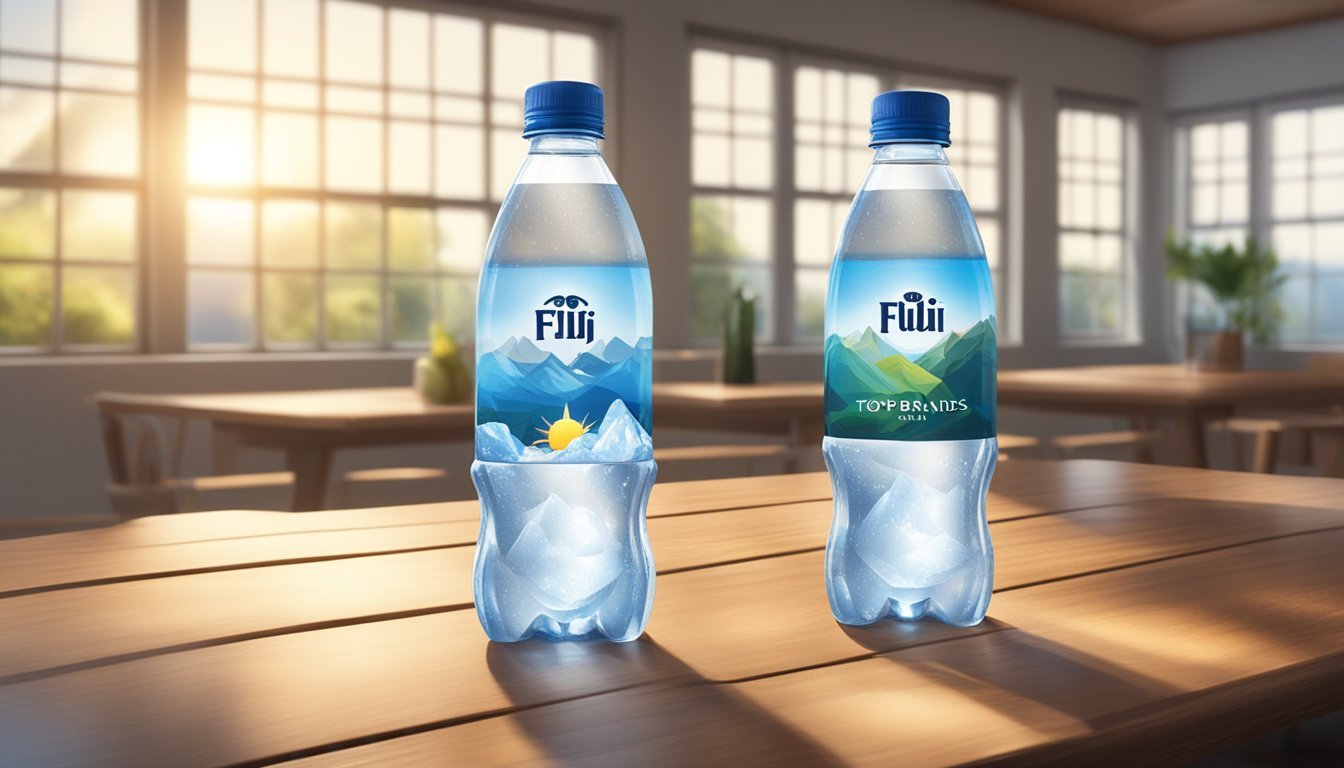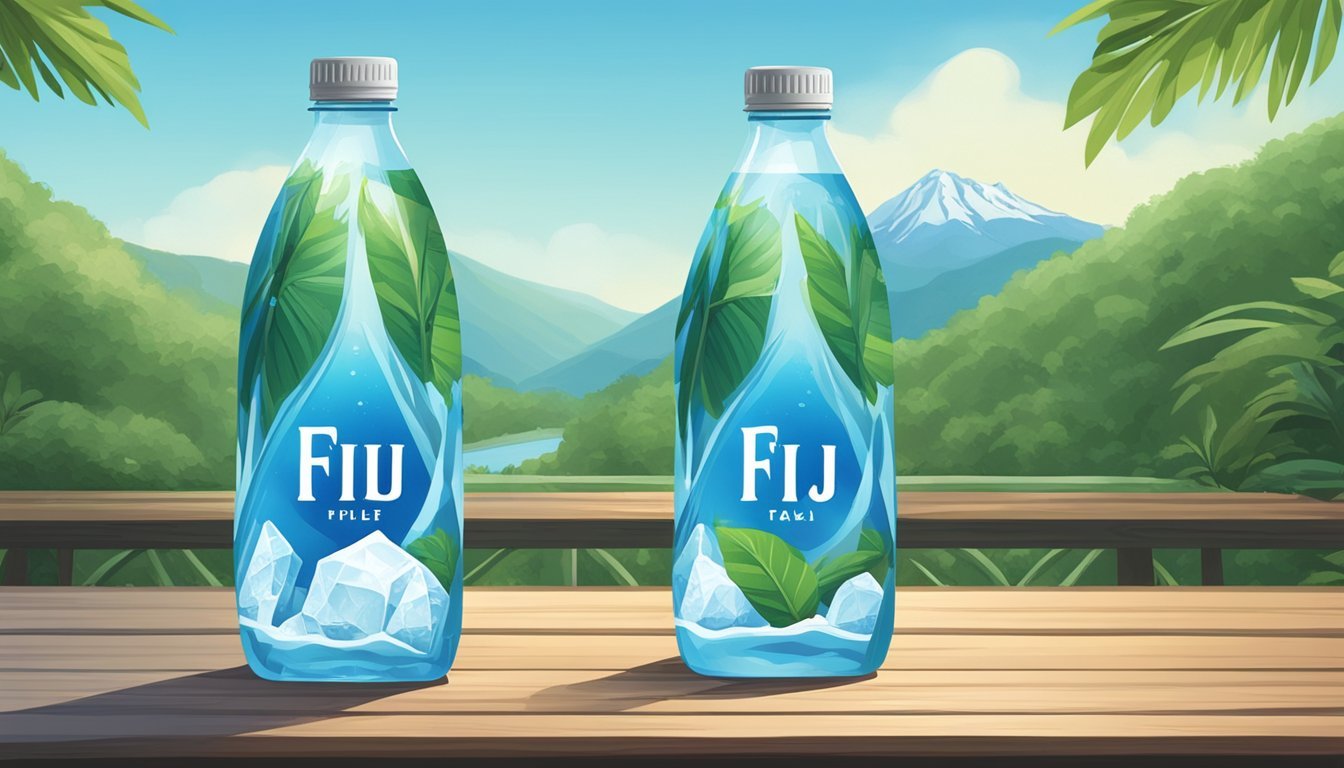Fiji vs. Ice Mountain
A Comparative Analysis of Bottled Water Quality
In the landscape of bottled water, Fiji and Ice Mountain are two brands that stand out for very different reasons. Fiji Water, sourced from an aquifer in the Fiji Islands, is often celebrated for its taste and the high level of silica it contains, which some people believe contributes to its silky mouthfeel. This brand has positioned itself as a premium option in the bottled water market, touting a unique mineral profile and a distinctive square-shaped bottle that has become a status symbol in certain circles.
Conversely, Ice Mountain sources its water from various springs across the Midwest United States and is known for its affordability and wide availability. It appeals to those who seek a quality product without the premium price tag associated with imported waters like Fiji. Ice Mountain's straightforward branding and taste profile make it a go-to option for everyday hydration needs.
The choice between Fiji and Ice Mountain does not merely rest on personal preference but also on factors such as environmental impact, the importance of brand ethos, and individual health considerations. Consumers may weigh the merits of taste and purity against cost and accessibility, making this comparison more than just a matter of which water quenches thirst better; it's a reflection of values and priorities when selecting a bottled water brand.
Bottled Water Overview
In this section, readers will understand the evolution and classification of bottled water, and become familiar with the regulations that govern its quality and standards.
History and Growth of Bottled Water
Bottled water has seen a significant rise in popularity over the years. Initially considered a luxury, it has become a staple for consumers seeking convenience and perceived quality over tap water. The International Bottled Water Association notes that the industry has grown due to consumer demand for healthier drink choices and the increased accessibility of bottled water.
Different Types of Bottled Water
Several types of bottled water cater to varying consumer preferences:
Spring Water: Originates from an underground formation and must flow naturally to the earth's surface or be extracted through a borehole.
Mineral Water: Contains not less than 250 parts per million total dissolved solids and originates from a geologically and physically protected underground water source.
Purified Water: Processed water that meets the purity standards set by pharmacopoeia. It may originate from spring, mineral, or tap water.
Water from brands like Fiji is famous for its natural artesian origins, while Ice Mountain is known for being sourced from natural springs.
Regulatory Environment and Standards
Bottled water is regulated by various government entities to ensure safety and quality for consumers. In the United States, the Food and Drug Administration (FDA) classifies bottled water as a food product, subjecting it to stringent production and labeling regulations. These standards are often comparable to the Environmental Protection Agency's regulations for tap water, aiming to maintain consumer confidence in bottled water as a safe and healthy drink option.
Examining Top Brands
In the pursuit of hydration, two top bottled water brands often come to the fore: Fiji Water and Ice Mountain. Each has a distinct profile, sourcing, and consumer perception. This section scrutinizes their characteristics and examines how they stack up against other popular brands.
Fiji Water Profile
Fiji Water originates from the tropical islands of Fiji. It is collected from an artesian aquifer where volcanic rock naturally filters the water, adding minerals and electrolytes. Known for its soft mouthfeel and iconic square bottle, Fiji Water has carved out a premium spot in the market. Its consistent placement as a top choice has more to do with its purity and taste, rather than flashy marketing.
Ice Mountain Water Profile
Ice Mountain Water stands as a well-known brand in the United States, especially in the Midwest. Sourced from springs and designed to be affordable, it is often praised for its clean and refreshing taste. Unlike Fiji, Ice Mountain is a domestic brand and does not import water, which gives it a smaller carbon footprint. This brand is often preferred by consumers looking for reliability and accessibility in their bottled water.
Other Popular Brands Comparison
Other brands in the market compete fiercely with Fiji and Ice Mountain. For instance, Evian and Voss offer similar mineral content to Fiji but at different price points and with distinct taste profiles. Brands like Dasani and Aquafina are purified municipal waters that contain added minerals for taste. Smartwater is vapor-distilled, with electrolytes added for flavor, aiming for a crisp taste. Icelandic Glacial sets itself apart with its high pH level.
For those preferring sparkling options, Perrier and San Pellegrino stand out, both offering unique mineral blends and carbonation. Nestle Pure Life is another everyday choice, offering consistent quality, although as research suggests, it may not always break into the top tiers of taste.
In the end, each brand targets different consumer preferences, price points, and lifestyle choices. Whether one prioritizes taste, purity, or environmental impact, there's a bottled water that fits nearly every criteria.
Health and Hydration
Proper hydration is crucial for maintaining good health, and the minerals and electrolytes in water can have significant benefits. This section explores how Fiji and Ice Mountain bottled waters contribute to these health aspects.
Benefits of Hydration
Hydration supports numerous bodily functions, such as regulating temperature, keeping joints lubricated, and removing waste. Both Fiji and Ice Mountain water can sufficiently hydrate the body. However, hydration levels are not just about water intake; the type of water matters as well. Fiji Water is sourced from an artesian aquifer in Fiji and has a unique mineral profile, while Ice Mountain is primarily sourced from groundwater in the United States and undergoes a different purification process.
Minerals and Electrolytes in Water
Minerals and electrolytes, such as sodium, calcium, and magnesium, help maintain the body's pH balance and hydration levels. Fiji Water is known to contain minerals like silica, which contributes to its smooth taste and potential health benefits. In contrast, Ice Mountain water has a diverse mineral composition due to the various sources from which it is drawn.
Fiji Water Mineral Content (Approximates)
Ice Mountain Water Mineral Content (Approximates)
Calcium: 3.4-88 mg/L
Magnesium: 1-26 mg/L
Sodium: 2.5-13 mg/L
It's noteworthy that while sports drinks like Gatorade and Propel are formulated to replenish electrolytes lost during intense physical activity, bottled waters like Fiji and Ice Mountain are generally not fortified with additional electrolytes but rather contain naturally occurring minerals.
Source and Purity
Selecting bottled water often comes down to the source and its overall purity. These factors greatly impact a water brand's reputation and the quality of the water provided.
Understanding Water Sources
Bottled water can come from various sources, each carrying distinct characteristics. Fiji Water is sourced from an artesian aquifer located in the Fiji Islands, where rainfall filters through volcanic rock, gathering minerals and electrolytes. The water collects in a natural artesian well, protected from external elements. Ice Mountain, on the other hand, sources water from multiple springs in the United States, primarily from groundwater reservoirs. These springs are replenished by rain and snow, filtering through soil and rock.
Purity and Contaminants
When evaluating purity, several factors are considered, such as the presence of minerals, solids, and potential contaminants:
Minerals: Water naturally acquires minerals as it flows through geological formations. Fiji Water contains minerals like silica, calcium, and magnesium from the volcanic rock it passes through. Ice Mountain typically has a lower mineral profile due to its different source.
Contaminants: Testing for heavy metals, arsenic, PFAS chemicals, and microplastics is vital. Both brands undergo rigorous quality assurance to ensure low levels of these substances. Consumer Reports' findings of PFAS in certain bottled water brands emphasize the importance of regular quality checks.
Bottled Water Filtration Processes
Both Fiji and Ice Mountain use filtration processes to ensure safety and taste.
Fiji Water utilizes a natural filtration process through volcanic rock and additional steps such as microfiltration and ultraviolet light to eliminate impurities.
Ice Mountain employs multiple steps in its process, including filtration, purified water methods, and, in some cases, ozonation to ensure the water's purity before bottling.
Both brands adhere to regulatory standards, maintaining the pH levels within an acceptable range and ensuring their products are safe for consumption.
Taste and Sensory Experience
When judging bottled water like Fiji and Ice Mountain, the sensory experience is central to preference. This includes the taste profile, the water's texture influenced by its mineral content, and the role of water sommeliers in assessing these qualities.
Taste Profiles of Various Brands
Fiji Water is often described as smooth and pure with a soft texture. It has a distinctive taste, which some attribute to the silica it contains, giving it a silky mouthfeel. Ice Mountain tends to have a light taste with a clean finish. Although devoid of strong flavor, its crispness is noted, making it a refreshing choice for many.
Impact of Minerals on Flavor and Texture
Minerals play a key role in the flavor and texture of water:
Calcium & Magnesium: Responsible for a smoother and somewhat creamier texture.
Sodium & Chloride: Can add a slight saltiness, which impacts the finish and overall taste.
Bicarbonates: Known to offer a crisp, clean taste, often desired in bottled water.
The mineral content not only shapes the water's flavor profile but also contributes to its mouthfeel, making the comparison between brands like Fiji and Ice Mountain a nuanced discussion of mineral balance and presence.
The Role of Water Sommeliers
Water sommeliers have the trained palate necessary to discern the subtle differences in flavor and aroma of various bottled waters. They evaluate:
Taste: Presence or absence of flavor notes.
Texture: The feel of the water in the mouth.
Finish: Aftertaste left by the water.
By considering these sensory experiences, sommeliers can assess and compare brands like Fiji and Ice Mountain, guiding consumers to understand the unique characteristics of each.
Environmental and Sustainability Considerations
When discussing Fiji and Ice Mountain bottled waters, environmental and sustainability considerations are crucial. One must examine the broader environmental impact of bottled water as well as the specific sustainable practices adopted by these brands.
Bottled Water and the Environment
Bottled water, be it still, carbonated, or boxed, presents significant environmental challenges. The Environmental Protection Agency (EPA) has indicated that increased production of plastic bottles for water has contributed to environmental pollution due to the resources used in production and the waste generated. Convenience drives the demand for bottled water, but it comes at an environmental cost.
List of Environmental Concerns:
Energy Consumption: Producing and transporting bottled water uses significant amounts of energy.
Plastic Waste: Most bottled waters are packaged in plastic, which can take hundreds of years to decompose.
Carbon Footprint: The entire lifecycle of bottled water, from bottle production to transportation, generates carbon emissions.
Sustainable Practices in the Industry
The bottled water industry has made efforts to incorporate sustainability into its practices. Fiji Water, for example, transitioned certain bottle sizes to 100% recycled plastic (rPET) in the U.S., a step towards reducing plastic waste. This move attempts to address the issue of plastic pollution by repurposing existing plastic material.
Industry Efforts Overview:
Recycled Materials: Transitioning to rPET bottles.
Water Source Management: Implementing practices to ensure the sustainability of the natural springs from which water is sourced.
Packaging Alternatives: Some brands offer boxed water, which may have a lower environmental impact than plastic bottles.
In contrast, Ice Mountain faces a lawsuit for allegedly advertising their water as "100% Natural Spring Water" while it reportedly contains microplastics. This accusation, if proven true, poses questions about the transparency and environmental accountability of bottled water companies.
Consumer Information and Trends
In the battle between Fiji and Ice Mountain bottled water, consumers are influenced by purity, taste, and brand reputation. Here’s what they tend to look for.
Analyzing Consumer Preferences
Consumers typically favor bottled water that offers a combination of taste, purity, and brand transparency. Convenience also plays a crucial role, with many opting for brands that are easily available in various retail settings. Consumer reports influence decisions heavily, as buyers look for third-party validation of water quality.
Taste: Preferences lean towards a neutral palette, with Fiji often praised for its smooth taste.
Purity: Concern over contaminants and microplastics has made purity a top priority.
Brand Transparency: After the Ice Mountain lawsuit regarding microplastics, consumers are scrutinizing claims of "100% Natural Spring Water" with more skepticism.
Trends in Bottled Water Consumption
Trends show a steady demand for bottled water, with a shift towards more sustainable and ethically sourced options.
Demand: Despite environmental concerns, convenience keeps bottled water in steady demand.
Sustainability: Trends are skewing towards brands with a lower carbon footprint, such as Fiji's efforts to use renewable energy in production.
Digital Engagement: Modern brands are expected to maintain interactive communication with their consumers through platforms like Twitter and use channels like email for direct marketing and feedback.
Safety and Regulations
When evaluating bottled water such as Fiji and Ice Mountain, safety and regulatory compliance are paramount considerations. These factors directly influence the water's quality and the health of consumers.
Compliance and Safety Testing
Bottled water companies must adhere to strict safety and quality testing to meet regulatory standards. The Environmental Protection Agency (EPA) sets legal limits on the levels of certain contaminants, including lead, in bottled water. This compliance ensures that the water provided to consumers is safe for consumption.
Fiji Water: After a 2024 recall due to safety concerns, it is reported that Fiji Water undergoes rigorous safety checks. They have taken measures to ensure that their bottled water is free of contaminants, aligning with customer health and safety requirements.
Ice Mountain: As part of the bottled water industry, Ice Mountain is also subject to stringent testing. They are required to routinely test for a variety of substances to certify that their products are safe and meet EPA standards.
Effect of Regulations on Industry Standards
Regulations have a significant impact on the bottled water industry’s standards. They compel companies to consistently provide water that is not only safe but adheres to health standards. The presence of microplastics and other contaminants is closely monitored to minimize health risks.
Industry Impact:
Fiji: The brand has addressed concerns over environmental safety by ensuring their products are compliant with current safety regulations.
Ice Mountain: By following regulatory guidelines, Ice Mountain works to maintain the safety of their bottled water, reassuring consumers of the brand's commitment to health and safety standards.
Economic Aspects of Bottled Water
The bottled water industry involves significant economic considerations, such as market demand and the cost of various brands.
Market Demand and Consumer Spending
Demand for bottled water varies by brand and is influenced by factors like marketing effectiveness and product quality. For instance, Fiji Water has cultivated a high-demand brand image, reflected in its pricing. Consumer reports often highlight Coca-Cola and Nestlé products, among others, for popular choices in the water segment. Brands such as Deer Park, owned by Nestlé, contribute to the economic dynamics with varying levels of consumer preference and spending.
Comparison of Cost Among Different Brands
Brand Avg. Price per Bottle Fiji $$$ Ice Mountain $$ Aquafina $ Nestlé Pure Life $ Deer Park $ Evian $$$
In comparing brands like Ice Mountain and Fiji, the price points reflect their market positions. Fiji Water is often perceived as an expensive water option. In contrast, Ice Mountain, owned by BlueTriton Brands, is positioned as a more affordable alternative. Coca-Cola’s contribution to the market with its brand Aquafina also serves as a benchmark for pricing, commonly less expensive than premium brands like Fiji.
Future of Bottled Water
The bottled water industry is gearing up for significant changes in response to environmental concerns and consumer preferences. Manufacturers are exploring new frontiers in eco-friendly packaging, while consumer trends indicate shifts in brand choices and types of water consumed.
Innovations in Bottling and Packaging
Manufacturers are actively working on innovative packaging solutions to reduce their environmental footprint. For instance, Fiji Water has taken a notable step by transitioning its 500 mL and 330 mL bottles to 100% recycled plastic (rPET) in the United States. This move is indicative of a broader industry trend towards sustainable materials, which is likely to continue as technology advances. Companies are not only focusing on the material but also on the design of bottles to minimize material use without compromising the integrity of the packaging.
Innovative Features:
Biodegradable materials
Reusable designs
Improved recyclability
Predictions on Consumer Habits and Brand Popularity
Consumer choices are increasingly driven by sustainability and health concerns. Brands that emphasize natural sourcing and the absence of contaminants, such as microplastics, are likely to witness a surge in popularity. Lawsuits, such as the one against Ice Mountain, alleging false advertising about natural spring water, highlight the importance of transparency and could impact brand reputations negatively.
Type of water is another dimension where change is expected. Consumers are showing a penchant for flavored and sparkling waters, with brands like LaCroix leading the charge in the sparkling water segment. This trend may see traditional still water brands diversifying their product lines to include such options.
Predicted Consumer Trends:
Preference for eco-friendly brands
Growing demand for flavored and sparkling waters
Heightened scrutiny of product claims
Conclusion
When comparing Fiji and Ice Mountain bottled waters, consumers generally find that both have distinct profiles catering to different preferences. Fiji is often praised for its neutral taste and considered a premium option, originating from an artesian aquifer in Fiji. It's packaged in a square-shaped bottle that is iconic, but it's important to remember that it comes in single-use plastic, potentially having environmental consequences.
Ice Mountain, on the other hand, is sourced from multiple springs in the United States and offers a more budget-friendly option without sacrificing quality. It's typically sold in eco-friendly packaging, with the company focusing on recyclable materials and resource conservation.
Feature Fiji Ice Mountain Source Artesian aquifer in Fiji Springs in the United States Taste Profile Neutral, "heavy" water Standard, refreshing Environmental Single-use plastic bottle Eco-friendly packaging options Price Point Premium Budget-friendly
Consumers should consider taste preference and budget in their choice but also the environmental impact of their purchase. Both brands have their merits, but the choice ultimately comes down to individual values and requirements.









